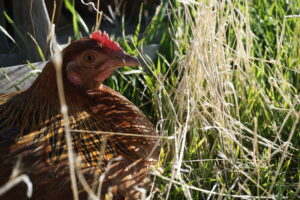 There is something meditative about hanging out with chickens.
There is something meditative about hanging out with chickens.
When my husband and I started farming, I thought it would be the goats that I would spend the most time with. Cute, energetic, weird eyes—what’s not to love about goats? Certainly we would be best buds.
It turns out that when I am in the mood to spend time outside with the animals, what most often draws me there is the desire for a break from constantly needing to do things (i.e. the dishes, the laundry, paying bills, writing…). The goats, while endowed with lovely personalities, are needy creatures. They shout at anyone in sight, demanding food, water, attention, and treats—just more things that need to be done.
So, I am drawn to the chickens. When we come near, our chickens rush to us, wings extended, excited by the sudden appearance of a human, but after that initial greeting, they do not demand much of us. If released from their pen to forage in the gardens, they do so happily with little need for affirmation or accompaniment. For me, being with chickens expends none of my caretaking or social energy. I am just there. The chickens are there. We are communally sharing in this joy of being out in the world.
Given appropriate weather and a comfortable enough seat, I could watch and listen to the chickens scratch and peck and softly cluck for hours. Their small movements—ducked heads pulling insects or seeds from between the dried stems of last season’s weeds, puffing up and then flattening out their feathers, scraping at the ground and then flattening themselves into the the sunny holes they’ve dug—vary just enough so that there’s always something toward which to train my eye. Once in a while, one chicken will encroach on another’s treasured find and the defender will yell and peck and chase them away. Spontaneously, another will decide to move across the yard to a more interesting spot for forage. Every now and then, a hen or two will remember I am there and come watch me for a few moments before carrying on with more important matters.
It is a good way to be in the world—sitting among chickens. I think for me, chicken watching carries similar benefits to “body doubling,” a strategy used by people with ADHD to stay grounded and focused. If I were to simply sit in the yard, sans chickens, my mind might go to any number of places—past failures, my current to-do list, the noises coming from the nearby road, that thing I have to remember to add to the grocery list or to tell my partner about later. Distractions quickly make simply sitting and enjoying the feeling of the sun or the pleasantness of my surroundings impossible.
With chickens, my mind stays (more or less) where they are. I might think about how to construct the new fencing I’m planning or what I should plant in the garden, but, mostly, I think about chickens. Then, while the part of my mind that must always be doing things tracks the endless fidgeting of chickens, the rest of me absorbs the sunshine, delights at the gentle breeze on my face, takes in the scents of whatever plants are most active now, and chuckles at the goats roughhousing in my periphery.
This has turned out to be a surprise benefit of chicken ownership. When purchasing our first chicks, we thought they would yield mainly eggs, fertilizer, and preliminary animal raising skills—maybe meat eventually if we got brave enough. They have done this (all except the meat), but have also given us something more.
I’m working on giving something back to them. There are two main projects on the agenda for the year: 1) moving the main vegetable garden from its current, chicken-adjacent home to a different part of the yard, and 2) building a multi-paddock chicken run in its place. Because we grow food here, we simply can’t let the chickens have their run of the place all the time. Besides that, there is no shortage of predators that would be happy to take a few that strayed too far toward the edges of the property. The next best thing I can give them is a chance to safely enjoy more space, more stimulation, and more diverse diets.
The more practical, efficiency-minded part of my brain tells me that this change will give us healthier birds that live and lay longer, and that their eggs will be better quality. But, the romantic, child-like side of my brain that loves all animals and cried when my dad killed the prairie dogs in my childhood yard just wants the chickens to be happy. This is one of those rare projects that will let me serve both sides at once—the one that justifies all my choices to the world in the most practical terms and the one that just loves everything and everyone incessantly and unrepentantly.
As I sit watching the chickens, though, I’m not thinking about how my brain works. Neither am I constructing justifications for my choices. I’m really not thinking at all. I’m just observing and absorbing all the scratching and pecking and clucking. I’m just being here: a person in the world among the chickens.

